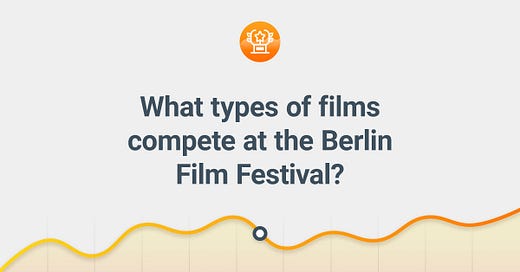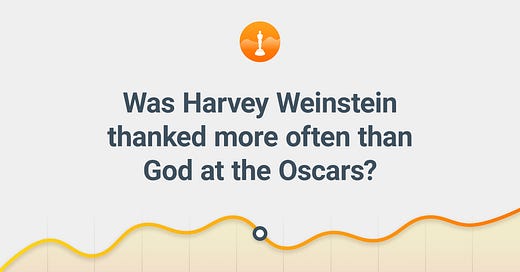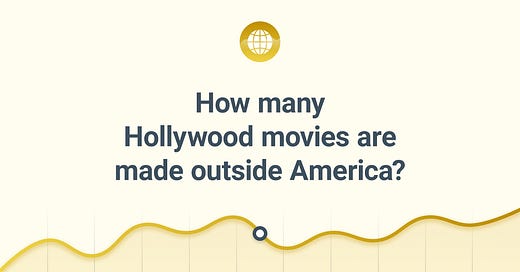
What types of films compete at the Berlin Film Festival?
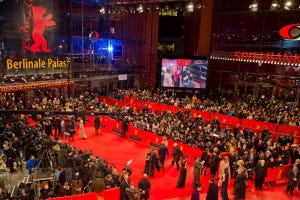
Later this week the 66th annual Berlin International Film Festival (known locally as the "Berlinale") will start in a rather chilly Berlin. This year, 18 films are officially 'In Competition', all vying for the coveted top prize, the Golden Bear. The festival was founded in 1951 and is currently regarded as one of the 'Big Three' film festivals, alongside Cannes and Venice.
However, the festival hasn't always been held in such high esteem and at one point was close to collapse. In 1970, one of the shortlisted films was O.K. (directed by Michael Verhoeven), which told the tale of a group of US soldiers raping a girl while on patrol in the Bavarian forest. The incongruous location was a thin disguise for the film's real message, namely an anti Vietnam War film which was commenting on the infamous incident of Hill 192 which took place just four years earlier (The Hill 192 incident was later directly dramatised in Brian De Palma's 1989 film Casualties of War). The 1970 Berlin festival jury regarded "O.K." as un-American and moved to have the film removed from the shortlist. This sparked protests by filmmakers and journalists and before long the situation descended into a chaotic collection of protests and counter-protests. In the end the jury was disbanded, no prizes were awarded and many films were pulled from being screened in support of one side or the other.
In 1971 it wasn't clear if the festival could survive but since then it has grown in size and stature. In order to understand what types of films the festival rewards, I looked at the 1,360 feature films which have been shortlisted at the Berlin Film Festival between 1951 and 2015. In summary...
81% of films at the Berlin Film Festival have been dramas.
Films from 79 countries have been shortlisted.
The most popular country of origin is France, which has provided more Berlin shortlisted films than Germany itself.
However, the Berlin film Festival is becoming increasingly German, with 35% of shortlisted films from 2010-15 coming from Germany.
English is the most popular language for Berlin shortlisted films.
Film critics and film audiences broadly agree with the Berlin festival juries about which are the best of the Berlin shortlisted films.
The most frequently shortlisted directors are Jean-Luc Godard and Rainer Werner Fassbinder.
Films at Berlin are getting longer.
Wer Bären fangen will, muss sich mit Drama versehen
Since 1951, 81% of films at the Berlin Film Festival have been dramas. 91% of films shortlisted between 2010-15 were dramas, compared with just 73% in the 1950s. In previous research, I've shown how films at the Cannes Film Festival and London Film Festival have a similar penchant for drama, accounting for 84% and 92% of their shortlisted films, respectively.
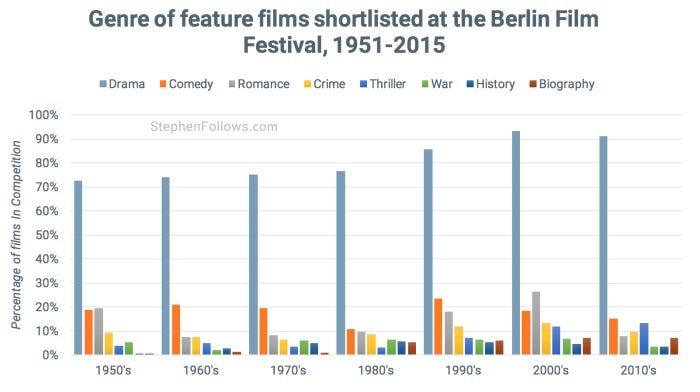
Teutonic francophilia
Films from 79 countries have been represented at the Berlin Film Festival over the years. Between 1951 and 2015, the country with the highest number of shortlisted films was, rather surprisingly, France. 22% of films at the Berlin Film Festival came from France, with 18% coming from Germany, 17% from America, 11% from Italy and 10% from the UK.
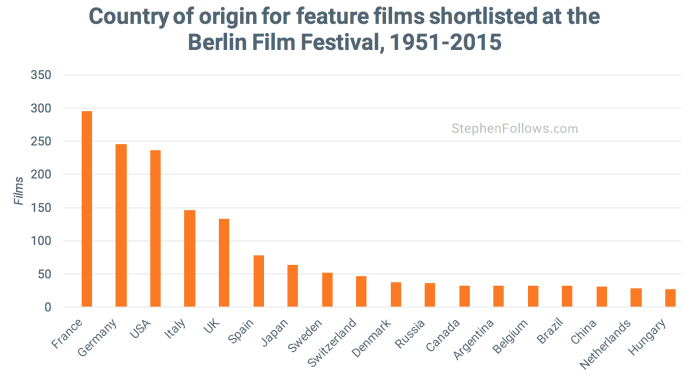
However, the Berlin film festival is showcasing home-grown films more and more, with a big increase in German films over the years. In the 1950s, only 9% of films were German, whereas in the 2010s this has risen to 35%. This mirrors the trend I found last year with the Cannes film festival becoming increasingly French: 8% of Cannes films came from France in the 1950s, rising to 53% in the 2010s.
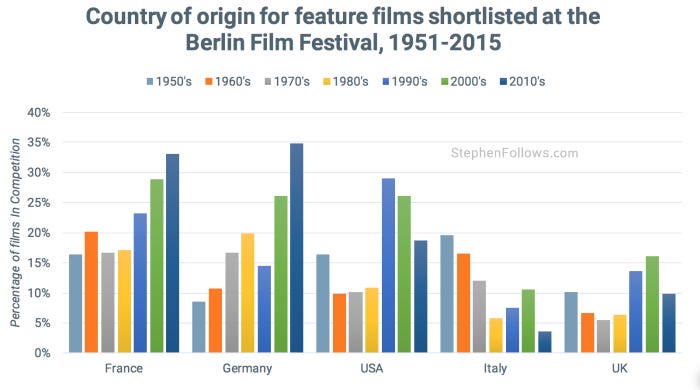
Sprechen Sie Englisch? Ja!
English is the preferred language of films shortlisted at the Berlin Film Festival, featured in 33% of films between 1951 and 2015.
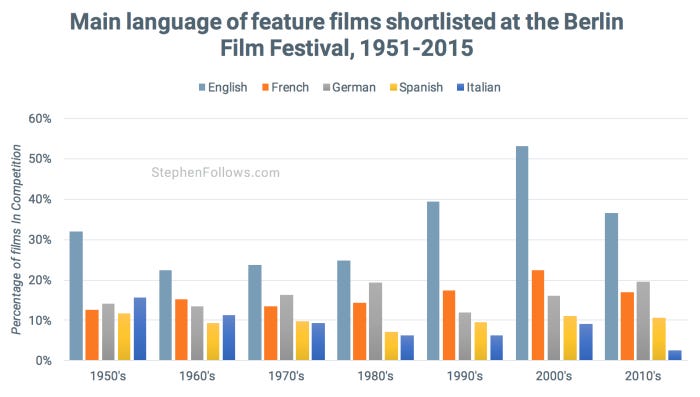
Do the 'best' films win?

Judging the quality of a film is always a slightly strange endeavour as data is not the best way of measuring art. However, we can compare which films the Berlin jury thought were the best each year (via looking at the Golden Bear winners) with opinions of film critics and audiences (via Metacritic and IMDb user ratings).
It seems that Golden Bear winning films are, on average, higher rated by critics and audiences, meaning that overall the juries seems to be pretty good at sorting the wheat from the chaff. The average metascore (average of all film critics ratings, out of 100) for shortlisted films was 68, compared with 76 for Golden Bear-winning films. Likewise, the average IMDb user score (out of 10) for all films was 7.0, compared with 7.4 for the winning films.
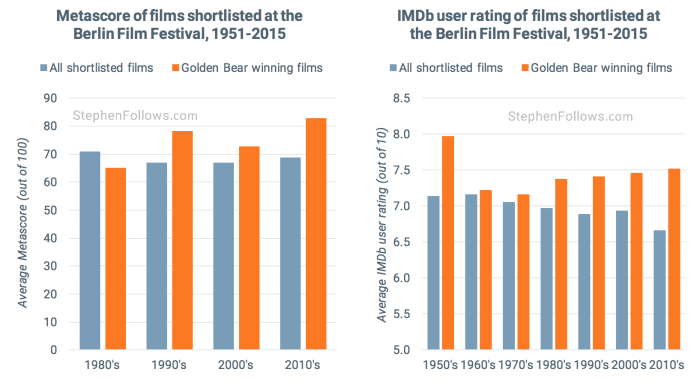
Friends of the Berlin Film Festival

The most frequently shortlisted directors at the Berlin Film festival have been Jean-Luc Godard and Rainer Werner Fassbinder, with eight films apiece.
Close behind with seven films are Andrzej Wajda, Claude Chabrol and Satyajit Ray and the 'Berlin-Six-Film-Club' includes Michael Winterbottom, Manuel Gutiérrez Aragón, Carlos Saura, Sidney Lumet, Bertrand Tavernier and Kei Kumai.
Running time
As a last piece of Berlin curiosity, it seems as though the shortlisted films are getting longer.
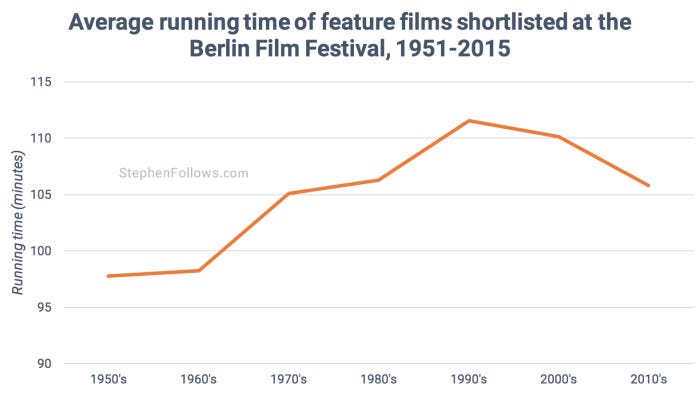
Notes

Finding films - Studying the films in the Berlin Film Festival turned out to be harder than I first envisaged. Records are patchy, with even the official festival website including an apology over incomplete record keeping. I used primarily the Berlin official website and then public sources such as IMDb and Wikipedia to fill in as many blanks as I could. In the end I found 1,360 feature films which were shortlisted in the official competition between 1951 and 2015, inclusive.
Country definitions - Tracking country of origin over time always presents the problem that countries change. In today's research I counted films from both Russia and the Soviet Union as coming from "Russia". Fans of world history may regard this as a rather flagrant over-simplification but without doing so it would have left both of those classifications off of the 'top countries of origin' chart. The Berlin Film Festival played an important role in celebrating the films of the Soviet Union and its satellite states at the height of the Cold War and so it seemed a shame to downplay their appearance at past Berlin festivals. Similarly, when looking at films from Germany, I included those from West Germany and East Germany within the classification of "Germany". The festival was established in what was West Berlin so unsurprisingly most of the films from pre-unified Germany came from West Germany (106 from West Germany and just 13 from East Germany). Some films had more than one country of origin, and on average each film had 1.49 countries of origin.
Critic and audience ratings - The Metascore analysis only covers from the 1990s as very few films before this point have been included on the Metacritic site. 21% of films from the 1990s have Metascores, with 60% of films from the 2000s and 53% of those in the 2010s. For IMDb user ratings I excluded all films with under 50 votes, in order to avoid a small number of fans (or friends of the filmmakers) skewing the rating. 95% of films had an IMDb rating, although only 75% of films had at least 50 votes. The vast majority of films without at least 50 votes were in the festival's early years. Of the films shown at the festival since 2000, 98% of them had at least 50 votes.
Genre - For genres, I used IMDb's classifications, meaning that a film can be assigned up to three genres. On average, each film had 1.66 genres.
Epilogue
I will be at the Berlin festival this year so if you want to catch up then just drop me a line.
Auf Wiedersehen, Filmdatenfreunde!


